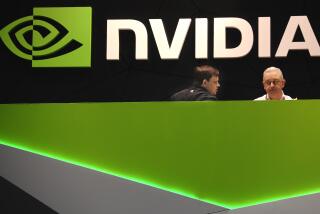Dell Profit Jumps 52%, Beating Expectations
- Share via
Dell Computer Corp. said on Wednesday that its fourth-quarter profit climbed 52%, beating expectations for the eighth straight quarter, as its build-to-order model helped it cut costs and boost sales.
Net income for the three months ended Feb. 1 rose to $285 million, or 81 cents a diluted share, from $188 million, or a split-adjusted 50 cents, a year earlier. Sales rose 55% to $3.74 billion from $2.41 billion. Dell also announced a 2-for-1 stock split, its fifth split in six years.
While some technology companies have been pounded by Asia’s economic crisis, Dell, based in Round Rock, Texas, has benefited by building its machines with cheaper disk drives, memory chips and microprocessors purchased abroad. It also escaped the Asian turmoil because only about 5% of its sales come from outside the United States and Europe.
“Across the board it was a very strong performance,” said analyst Vadim Zlotnikov of Sanford C. Bernstein & Co., who had expected sales of $3.62 billion. “The top-tier guys have a tremendous advantage in costs. They gain share and grow above market rates.”
Analysts expected earnings of 76 cents at the world’s No. 3 PC maker, the average estimate from First Call Corp. Dell’s stock rose $1.88 to close at $113.19 in Nasdaq trading, a record high.
Dell said it expects PC demand to continue to be strong in 1998 as corporations upgrade to PCs featuring new chips from Intel Corp. and new software from Microsoft Corp.
“It’s going to be another great year,” said Chairman and Chief Executive Michael Dell. “We have every opportunity to grow faster than the market.”
Dell’s gross margin, or the percentage of sales remaining after costs of production are subtracted, narrowed to 22% from 22.5% in the third quarter. Gross margin had been expected to narrow by 0.5 percentage point, analysts said.
Dell sells its machines directly to customers instead of through resellers and distributors like many other manufacturers. This lets Dell carry very low inventory and build machines only as it receives orders, so any cost savings in parts goes immediately to the bottom line or to price cuts.
Michael Dell also said his company has no plans to sell so-called sub-$1,000 personal computers, because they aren’t profitable enough and there isn’t enough demand.
“Why would we want to enter an economically dilutive business?” he said. “We grew our consumer business 98% without a $1,000 PC.”
Dell also grew its server and workstation business by 250%, or 11% of its total fourth-quarter sales. Notebook sales rose 74%.
More to Read
Inside the business of entertainment
The Wide Shot brings you news, analysis and insights on everything from streaming wars to production — and what it all means for the future.
You may occasionally receive promotional content from the Los Angeles Times.









